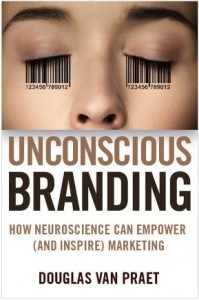 Summary. Advertising and marketing are constantly evolving to achieve greater impact with more efficiency.
Summary. Advertising and marketing are constantly evolving to achieve greater impact with more efficiency.
The most significant, useful, and relevant development in recent years has been the ability to specifically deliver advertising only to groups that are likely to be interested in the product or service being advertised. This benefits advertisers and consumers, and most people would agree it’s a good thing.
However, if gone unchecked, advertising methods can take on a somewhat creepy form. The latest book by Douglas Van Praet is Unconscious Branding: How Neuroscience Can Empower (and Inspire) Marketing. This book is an essential guide to all consumers to defend themselves against the next wave of corporate mind control. Although Van Praet is actually promoting and defending the idea of unconscious branding, this book will empower consumers by giving them a thorough history of marketing and advertising, as well as a glimpse into the future of the advertising industry.
In his book, Van Praet explores the science of Unconscious Branding through neuroscience approaches to marketing. Neuroscience customization and optimization of marketing is to advertising what GMO is to food production — an imperceptible hidden accelerator and controlling agent. It’s like the MSG of advertising.
Traditional advertising provides consumers with information about a product, its benefits and value. However, let’s say you are trying to sell a product that consumers don’t need or want, or perhaps it’s overpriced. In their conscious mind, consumers will make rational, logical, and self-preserving decisions based on facts and marketplace factors. However, if one manipulates the minds of consumers using neuroscience approaches to marketing, they become more malleable.
Van Praet explains:
“Unfortunately, businesses have long based their marketplace knowledge on culture and economics and not on the truths of biology and brain evolution. They have borrowed heavily from the social sciences while virtually ignoring the natural sciences, leaving so much fertile ground with woefully few farmers. This new shift from a cultural to a biological view of behavior is one of the most exciting and promising opportunities in the history of humanity. … It’s time to reveal the hidden depths below our behaviors and to see how our most basic instincts, emotions, innate predispositions, and unconscious learned behaviors can be used to better connect brands with humanity.” – From the Introduction
“The central thesis [of Vance Packard’s highly influential book The Hidden Persuaders] was that we were being monitored and manipulated by marketers and advertisers without our conscious awareness. A year later, a government investigation by the CIA led to a ban on these … in the United States. The reports concluded that: ‘Certain individuals can at certain times and under certain circumstances be influenced to act abnormally without awareness of the influence.'”- From Chapter 1, the Myth of Marketing.
__________
Disclosure. To be fair, it’s important to share this disclaimer offered by Van Praet in the introduction to his book, “If you are interested in manipulating minds, please don’t bother reading this book.”